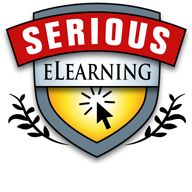- Home
- Articles
- Reviews
- About
- Archives
- Past Issues
- The eLearn Blog
Archives
| To leave a comment you must sign in. Please log in or create an ACM Account. Forgot your username or password? |
|
Create an ACM Account |

The state of eLearning isn't improving. In fact, to four of us who were conversing on the expo floor at yet another eLearning conference, it appeared to be regressing. And we cared, so we wondered what we could do about it. The conspirators were Julie Dirksen (author of Design for How People Learn), Will Thalheimer (one of the great translators of research to practice and author of Performance Focused Smile Sheets), Michael Allen (CEO of Allen Interactions and author of Michael Allen's Guide to eLearning), and yours truly.
We discussed several ideas, trying to figure out just how we could raise the issue in a way that would garner some attention. We tossed ideas around after the event, and allowed the intent to percolate over time. Because we felt that it's important to be positive, we wanted to raise the issue without any direct indictment of existing people or organizations, yet point to the problems and possibilities. We needed something that we could promote in good conscience.
Finally, Michael (inspired by the "Agile Manifesto" and the concept of serious games), emerged with the idea of a "Serious eLearning Manifesto." The concept was a statement that suggested what good, serious eLearning looked like, and how you could get there. The rest of us bought in. This was something we figured people would be able to get behind.
As you might imagine, it wasn't easy to get four opinionated people to agree on what should be covered, regardless of how committed they were. We wrestled with the concepts to include, how to present them, all the way down to the wording and order of elements. But we diligently worked iteratively over months, mixing it in with our pre-existing commitments.
What ultimately resulted was a statement of eight specific ways that serious eLearning differs from typical eLearning (see Figure). The elements include being:
We buttressed these eight values with 22 research-based principles culled from decades of work. The research isn't ours, to be clear, it's the work of scientists around the globe who continue to investigate what leads to successful learning and instruction. Will was a prime instigator here, promoting necessary concepts. Julie was a voice of reason from the perspective of practitioners. We all took turns wordsmithing the actual language.
Let's clarify, this isn't just about eLearning. We believe at least seven of the elements apply to all instruction. The "individualized challenges" element is a wee bit harder to address in face-to-face instruction, but there are interpretations that are doable. Still, we felt our credibility was strongest in eLearning, and there's a huge opportunity for improvement even within that area.
Our goal was to provide for a number of stakeholders. We want eLearning designers to have goals to shoot for and leverage for resources, purchasers to have criteria, vendors to argue for better designs, societies to have criteria, and more. We want it to be used!
We also want to be clear that while we want people to sign on, we do not expect everyone to automatically change to a completely new approach. We view this as a destination and a journey, not a fiat. As to where to start, I suggest beginning with practice, as the most important component of the learning. This implies objectives, contexts, decisions, and feedback. If you get that right, most of the rest should follow.
When we'd agreed on the content, we wanted to launch with some impact. We decided to reach out to representatives from a wide variety of sectors: individuals representing vendors, design gurus, and societies, and 33 agreed to serve as trustees for the Manifesto. (We didn't reach everyone we should have; we had an agreed-upon deadline for the kickoff that precluded reaching all the folks that would have been appropriate.) We also got the major societies in the field to agree to approve the initiative.
We launched in the spring of 2014. Special thanks are owed to Michael Allen who donated resources from Allen Interactions to develop the visuals and host the site, with no entailments. To date we have more than 1,000 signatures. We'd welcome your scrutiny of the proposal, and if you feel you support the initiative, we'd love to have your commitment as well!
Clark Quinn, Ph.D., consults to organizations including corporate, government, not-for-profit, and the education sectors on the strategic use of learning technology. With both an academic and organizational background, his work has been acknowledged by invitations to keynote nationally and internationally as well as authoring numerous articles, chapters, and four books. Clark was recognized as the eLearning Guild's first Guild Master in 2012.
Permission to make digital or hard copies of part or all of this work for personal or classroom use is granted without fee provided that copies are not made or distributed for profit or commercial advantage and that copies bear this notice and the full citation on the first page. Copyrights for third-party components of this work must be honored. For all other uses, contact the Owner/Author.
2018 Copyright held by the Owner/Author. 1535-394X/18/01-3178882
|
To leave a comment you must sign in. |
|
Create an ACM Account. |